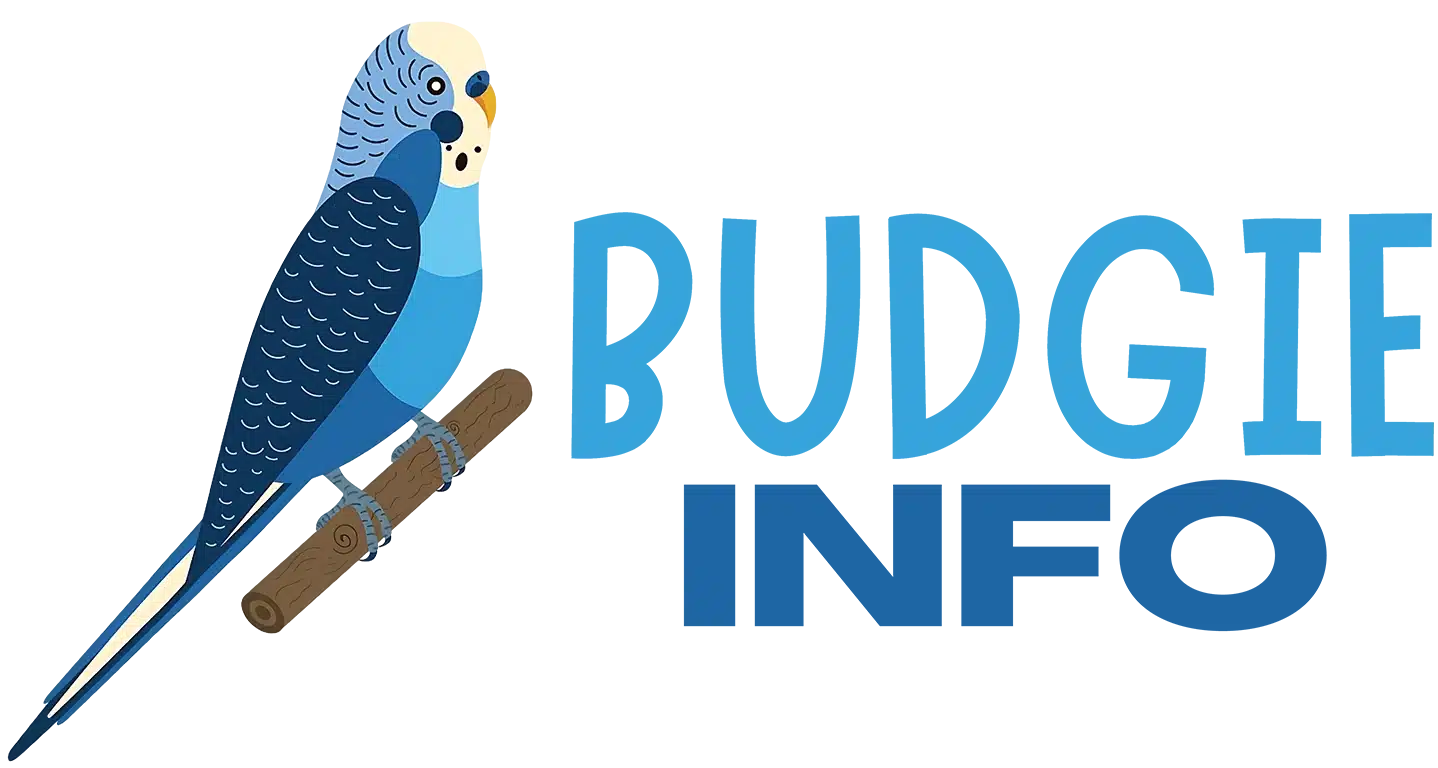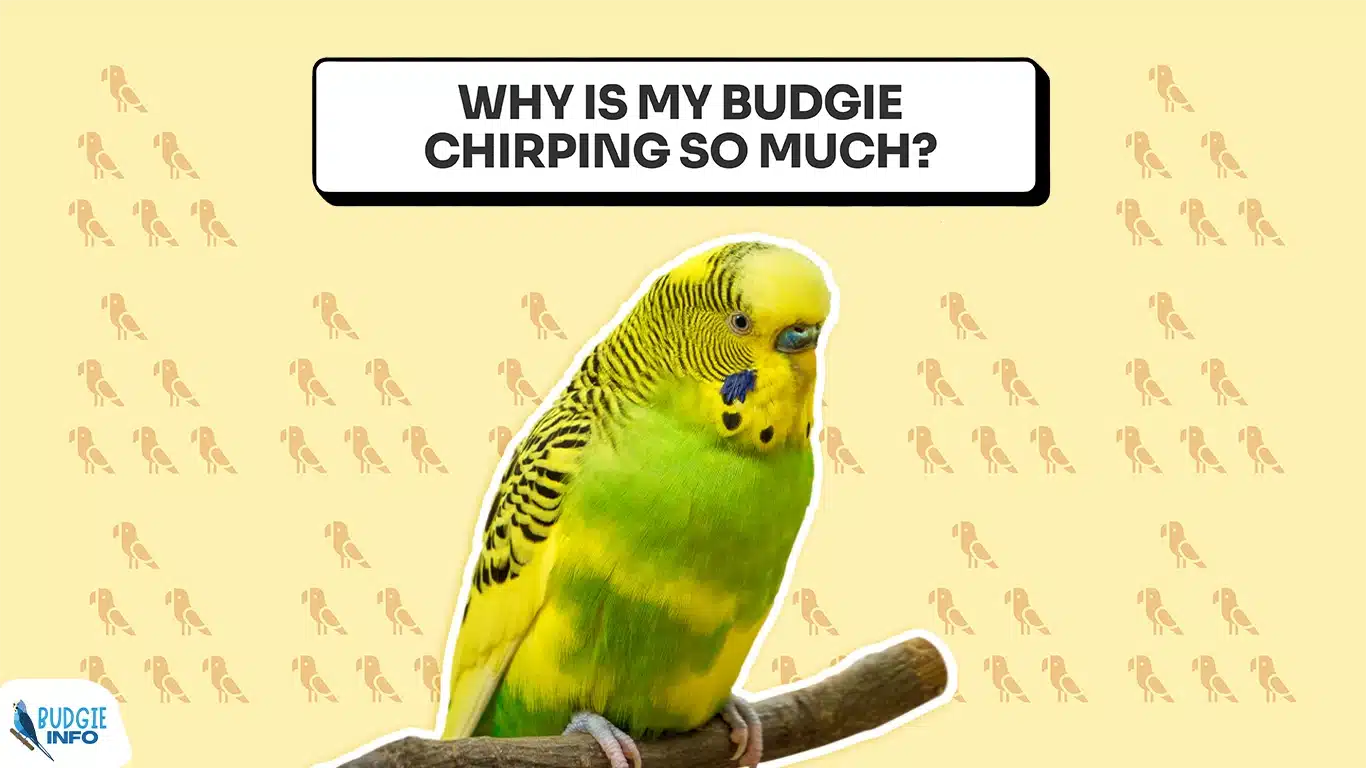Budgies are lively little birds with a lot to say. When they chirp, they’re sharing their feelings and needs with us. If your budgie’s been extra chirpy lately, then a question may arise, why is my budgie chirping so much?
Budgies chirp for various reasons: they might be communicating, expressing joy, signaling discomfort, or simply trying to get your attention. Paying close attention to their behavior and surroundings can help pinpoint their chirping motives.
Alright, in this article, we have discussed all things about budgies chirping. Keep reading to get the full scoop!
Why Is My Budgie Chirping So Much?
Budgies are naturally vocal birds that often chirp frequently. If you’ve ever wondered why your budgie chirps so much, we’ll explore the reasons below in more detail.
The array of sounds they make can be both entertaining and, sometimes, a bit baffling. Their chirping isn’t just random noise. It can be indicative of various emotions, needs, or responses to their surroundings.
Alright, let’s take a closer look at these 6 reasons behind all that chirping from your budgie friend:
1. Expressing Happiness
Budgie will often chirp, sing, or whistle. When they’re happy with their environment, their food, or just feeling in a good mood, they’ll let the world (or at least their immediate surroundings) know!
2. Curiosity
Budgies are curious creatures. Whenever they spot something unfamiliar in their area or come across something they don’t quite understand, they tend to chirp.
It’s their way of showing interest and trying to make sense of things.
3. Budgie Communication
If you have more than one budgie, you’ll notice they often chirp at each other. This is their way of socializing, bonding, and, sometimes, asserting dominance.
4. Responding to Environmental Stimuli
Budgies are pretty alert birds. If they hear a sudden noise, feel a gust of wind, or even see a shadow move, they might start chirping more.
It’s their way of responding to changes in their environment. They like to keep tabs on what’s happening around them.
5. Calling for Attention
Yes, budgies can be attention seekers! If they feel you haven’t been paying them enough attention or they’re bored, they might chirp to get you to notice them.
6. Distress Signals
If your budgie keeps chirping loudly or seems panicked, it might be upset or not feeling well. This could be because of something scary nearby or a health problem.
Why Is My Budgie Chirping So Quietly?
Have you heard your budgie chirping softly and wondering what’s going on? Well, quiet chirping can mean a few things.
- Contentment: Just like us humming a tune when we’re in a good mood, a budgie might chirp quietly when feeling content and relaxed in its cage environment.
- Introspection: Yep, birds can have deep thoughts too! Your budgie might just be in a reflective mood, contemplating its birdie life.
- Feeling under the weather: If you notice your budgie isn’t chirping as much as it usually does, there’s a chance it might not be feeling its best. It’s always good to keep an eye on any changes in their behavior.
Here’s a tip for you, if your budgie chirps quietly, take a moment to observe its body language. Is it puffed up? Is it eating and drinking normally? The combination of its body language and vocalizations can offer insights into its mood.
Why Is My Budgie So Loud In The Morning?
Many birds, including budgies, are diurnal. This means they’re most active during the dawn hours, responding to the first light of the day.
As the sun rises and casts its first rays, budgies and many other birds find their voice, engaging in what is known as the Dawn Chorus.
If your budgie’s singing feels a bit loud, just think of it as them joining nature’s morning song. It’s like they’re a part of nature’s band, and they’re giving it their all.
Why Does My Budgie Chirp When I Talk?
Talking with our pets is quite common. I talk to my budgies all the time and believe me they have a lot to tell us.
Once I remember that day when I shared my worries with my budgie, and he began chirping softly. It seemed like he knew how I felt and was trying to comfort me. These birds really have a way of picking up on our emotions and reacting so sweetly.
Budgies are social birds used to being in lively environments. So, when you talk, they feel included in the conversation.
Whether you’re telling a story, humming, or just speaking your thoughts, your budgie takes it as a group talk. Their chirping is their way of saying, I’m right here with you, and I’m listening.
Why Does My Budgie Chirp When I Leave The Room?
Every pet owner has experienced moments when they’ve wondered what their pet is thinking. Budgies are no exception!
One day when I was going outside for something to eat and heard some lively chirps. When I came back, my budgie had flipped over a toy. It felt like he was telling me about his little mishap, kind of like how a kid shares a funny moment. He just wanted to stay connected, even if I was gone for a bit.
Here’s an interesting thing about birds: they use Flock Calls. In the wild, budgies always talk to each other to stay safe and connected. When they live with us, we’re like their family. So, if you leave the room, your budgie might chirp!
TIP To keep your budgie at ease while you're away, consider leaving a radio on or playing some soft music. It's a simple act that can offer them a sense of companionship and comfort.
Why is My Budgie Chirping So Much at Night?
Ever been woken up by your budgie chirping at night? It can be not very clear, especially when everything else is quiet. There are a few reasons why your budgie might be chirping at night:
- Disturbances: Just like we’d wake up if there was a loud noise outside, budgies can be disturbed by sudden sounds or movements.
- Inadequate Darkness: Budgies need a certain amount of darkness to feel it’s time for bed. Too much light can mess with their sleep rhythm.
- Dreams: Believe it or not, budgies might dream just like us! Sometimes, their chirps could be because of what they’re dreaming about.
If the nocturnal chirping becomes a regular affair, it’s worth a pause. It might indicate stress or a potential health issue. Check if the room is dark and quiet enough for your budgie’s comfort. And if you’re concerned, never hesitate to consult with a vet.
Here’s a last tip for you, If you want to help your budgie sleep better, consider using a soft cage cover. It’s a simple way to let them know it’s time to wind down for the night. Plus, the cover creates a safe and cozy environment, making them feel secure as they settle in for some rest.
Why is My Budgie Making Whimpering Noises?
Every budgie owner knows these cheerful birds for their lively chirping. However, when the tunes turn to something resembling a whimper, it’s a clear sign they’re trying to communicate something more serious to us!
Whimpering or distressed sounds are not just random noises. They can be indicative of several things:
Discomfort
Just like how we might wince or sigh when we’re uncomfortable, budgies express their discomfort through sound. Maybe the room’s too cold, or perhaps they’re not happy with a change in their environment.
Fear
Budgies are prey animals. Loud noises, sudden movements, or the sight of potential predators (like that curious cat from next door) can evoke a fear response. Their whimpering is akin to a child crying out when scared.
Health Issues
At times, whimpering can be a cry for help. It might be related to physical pain, or it could be an early warning sign of an underlying health issue.
If your budgie keeps making whimpering noises or seems tired, puffy, or isn’t eating like usual, something might be up! If you see these signs keep up, it’s highly recommended to check in with a vet.
Final Words
That’s all! Now you know why your budgie chirps so much and guess what? These little birds have a lot to say! From morning songs to chit-chats with us and even their nighttime thoughts, they’re always expressing themselves.
FAQs About Why Is My Budgie Chirping So Much
Why is my budgie chirping non-stop?
They’re often expressing happiness, seeking attention, or reacting to sounds. However, continuous loud chirping might indicate stress or discomfort. Monitor their environment and behavior for clues!
How do I know if my budgie is sad?
Look for less chirping, reduced appetite, ruffled feathers, and less activity. Changes in behavior, like a sudden dislike for toys or not wanting to interact, can also be signals.
My budgies are chirping a lot! Does that mean they’re happy?
Yes. Frequent chirping often indicates contentment, curiosity, and playfulness. But always keep an eye out for context and environment to ensure it’s joy and not stress.
My budgie keeps chirping and wants out of the cage. Is that usual?
Yes, it’s common! Budgies are social and curious birds. They often chirp to communicate and may want out for exploration and interaction. Ensure a safe environment if you let them out!
What does an unhappy budgie sound like?
It may make sharp, short, repetitive chirps or distressed squawks. Changes from their usual happy chirps to more frantic or continuous sounds can signal discomfort or stress.

I’m Shajid Rahman, a happy owner of 6 beautiful budgies. I take care of this website to share tips, fun facts, and care guides about these birds.
Whether you’re a budgie lover or considering one as a pet, you’ll find helpful info here! I love these cute creatures, so I made this blog for Budgerigar fans. You can expect to get reliable information based on my years of experience. More About Me →

